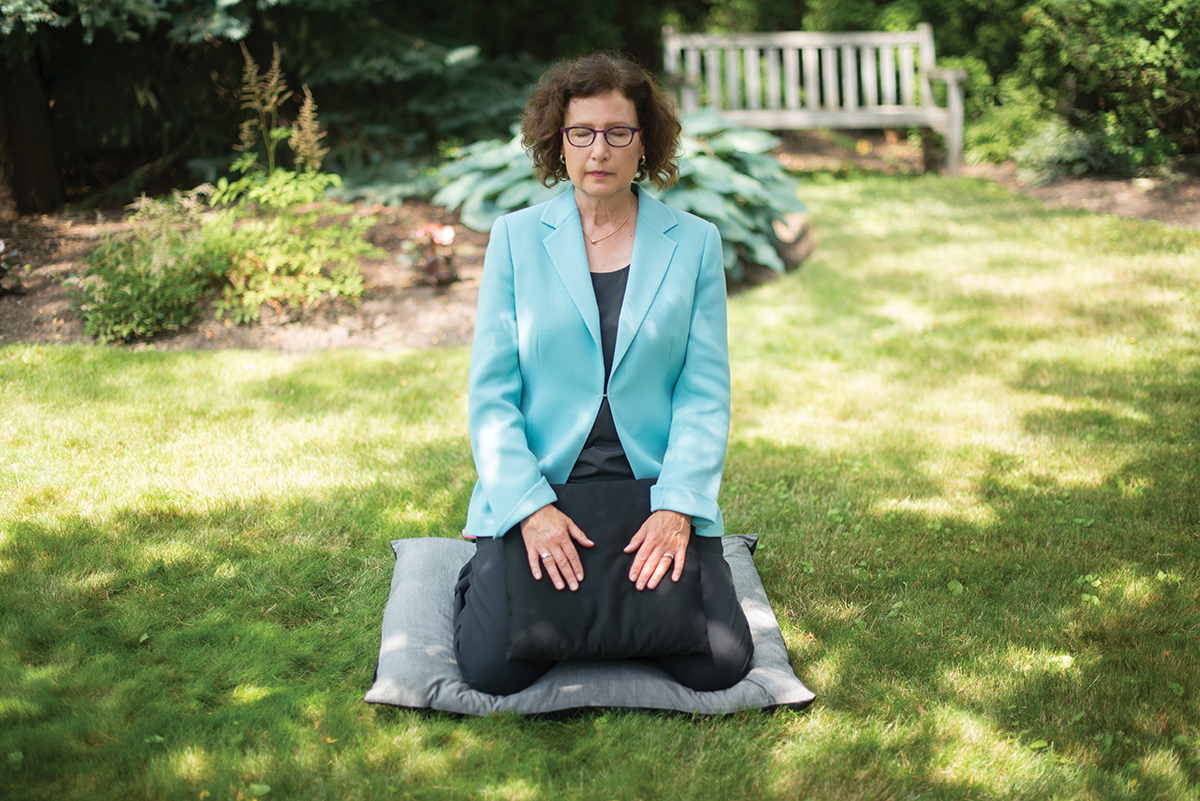A declaration of identity, no matter how quiet, is always bold.
In our everyday world, we often interact superficially with one another rather than with our whole being. Yet we immerse ourselves in Facebook, Instagram, YouTube, 24-hour news coverage and reality TV, endlessly fascinated with stories and images.
You may unsubscribe from any of our newsletters at any time.
We are constantly looking for openings to see what constitutes our fellow human being. When a “closet door” opens, a crowd forms. Artists let us in through their creative expression. This is what draws us into theatres, concert halls and galleries.
What is one of the most pressing personal secrets today? What aspect of identity is seldom discussed, rarely admitted to and potentially seen as an admission of weakness? It is spiritual persuasion.
Recently, my friend Judith Macdonell and I had a long talk over coffee at Tim Hortons. Next to us, a man was reading what appeared to be biblical passages on his laptop. When I left the table for a moment, he turned to Judith and said, “You ladies understand metaphor.” Pardon? “I couldn’t help overhearing your conversation. I used to be a hard line Pentecostal and took everything in the Bible literally, but now I understand metaphor.”
He introduced himself as John and told us that he had realized that when Jesus said, “The Kingdom of God is within you,” he actually meant it. For John, God was no longer far off. He no longer believed that he had to go through ministers or a church or Jesus to experience God. As he talked about how everything is interconnected, and how he feels love for everyone at Tims because all, in essence, is God, he was glowing with an inner conviction that wasn’t evangelical, but it was genuine.
Judith and I had been discussing ideas that might be considered spiritual, but were far from religious. Nevertheless, John recognized something between the words, and then we recognized what he was saying as germane to our conversation.
Strangers may not strike up conversations about God every day at Tim Hortons. Yet as we discovered, when people do open up about this subject, remarkable moments can happen.
Not so long ago, a majority of Canadians had respected, publicly sanctioned places in which they acknowledged and affirmed the presence of God: the church, temple or synagogue. In the last 50 years, these long-standing pillars of Western civilization have declined dramatically in attendance and authority.
This observation is not meant to minimize in any way the experiences of those who continue to find religion meaningful and relevant. In fact, they are perhaps to be envied: they have a place that speaks to them and nurtures their souls. Yet, for most of us, the era of institutionalized religion has passed.
As families left the church, the trend carried with it an implicit rejection of the entire proposition of spirituality. It was assumed that Canada was becoming a secular country. But, are we not going to church because we have lost the conviction that there is a higher power? Or because going to church no longer satisfies this impulse?
A 2015 Angus Reid Institute poll found that 73 percent of Canadians believe in God or a higher power, yet only 23 percent attend church regularly. The poll also separated religious affiliation from spirituality, which produced a surprising result:
• 39 percent said they were spiritual but not religious (“SBNR”)
• 34 percent said they were religious
• 27 percent said they were neither religious nor spiritual
The awkwardly named SBNR — a label defined more by what it is not than by what it is — is actually Canada’s mainstream choice.
Does Canada appear to you to be a country in which 73 percent of the citizens are either spiritual or religious? It doesn’t to me. In Toronto, people in both of these groups feel that they are in a minority in a society dominated by people for whom religion is a relic of the past and alternative spiritual paths are New Age cults.
What accounts for the gap between how Canadians self-identify in a survey, and how secular our society appears to be?
First, many of the SBNR are quiet about it, not wanting to sound religious using words like God, and not wanting to seem New Age-y using words like consciousness. In Canada, there are few, if any, forums for spirituality outside of religion. Yet, I found over and over in talking with people about this subject that they first describe it as “taboo,” and then they say, “I could talk with you all day about this.”
Secondly, those identifying as SBNR are doing things that some would not recognize as spiritual: meditating, writing in journals, singing in choirs, running long-distance, practising yoga, reading books by spiritual teachers, listening to lectures, attending workshops, immersing themselves in nature, immersing themselves in art. Yet these are activities that people are doing to establish something in their lives that is not purely intellectual, something that is not limited to their everyday worlds and the personality complexes they appear to be.
It is easy to dismiss many of these activities as feel-good personal indulgences that are a long way from a serious spiritual quest. Many people do begin them motivated only by personal goals. Yet in the name of regaining the present moment and overcoming the stresses of the digital age, a new generation is discovering ancient truths. While most are not yet ready to publicly share their new declaration of identity, their answer to the question “What am I?” is being reshaped by what they are learning about themselves. Some are now seeking out the philosophical underpinning of their apparently “not spiritual” practices and looking for ways to go deeper.
We now live in a world in which Google Inc. presents lectures by spiritual leaders and teaches contemplative practices to employees. The Rotman School of Management at the University of Toronto offers a two-day $1,800 course on mindfulness. Corporations are adding meditation rooms to their premises. Hospitals are incorporating meditation and mindfulness programs. Children are being taught meditation at school. The countercultural is becoming cultural.
I felt the shift from fringe to mainstream every step of the way. My parents were PhD biologists, and our family believed in science, not religion. As a teenager (still living with my atheist parents), I met philosopher and metaphysician Kenneth G. Mills, who became my mentor. Mills was a former concert pianist and piano teacher who, after a series of mystical experiences, began giving lectures in spontaneous poetry and prose that he called “Unfoldments.” His life was based on the premise that, as he put it, consciousness is fundamental and what you are conscious of constitutes your experience. He attracted a growing group of people who found his words and his presence a doorway to inner unfoldment.
Shortly after I started on this journey, my father was up early one Saturday morning and caught me sitting on the living room floor attempting to meditate. There was great embarrassment on both sides, and we never mentioned it again. To my dad, meditation meant that I was into something foreign and cult-like. How much has changed in four decades! Today, if a father got up and found his teenage daughter meditating, there would be a celebration.
Ideas that were strange and difficult to understand in the 1970s are much more widely accepted today. Back then, we learned to observe the workings of our minds as though we were being indoctrinated into a secret knowledge. Now, school children are learning the language, emotional maturity and awareness to watch their thoughts and choose which ones to invest with energy and emotion.
While studying with Mills, I got an MBA and became a strategy consultant with The Boston Consulting Group and then a business executive. Friends on both sides of the spiritual and secular divide were highly skeptical about combining a serious spiritual quest with a business career.
For most of those years, I kept my experience with Mills firmly to myself. I didn’t want other people’s thoughts and opinions stomping all over my interior garden. I also wasn’t sure I could adequately represent Mills’s philosophy, or even explain my own dedication to studying it. It was a world apart, a rarified realm of sensitivity, realization and artistic expression that even now I can only wonder at.
For me, the decade since Kenneth Mills’s passing has been about distilling the experience and making it my own. An inner pressure to bring the two sides of my life together has been part of this journey. Being open about it has been made easier by the shift in our society in which acknowledgement of spirituality outside of religion has become more acceptable. In fact, as a former colleague recently observed, if I were to do the combination of a business career and spiritual quest today, I would be trendy.
I don’t sense an appetite in Canada to replace religion with a new form of institutionalized spirituality. Perhaps it is the diversity of our country. But more fundamentally, most of us are no longer seeking the comfort of a belief system in an unknown universe. We are seeking knowledge of what we are in essence, including the visible and the invisible, both materiality and our non-material nature.
The debate of my parents’ era between religion and science continues today. The SBNR have joined the table, but they are not there to debate. They are not interested in making the case for SBNR. In fact, they have probably recently abandoned some beliefs — either religious or atheist — and are shaking off old definitions and dichotomies, looking for new answers. Rather than promoting a new belief system, the SBNR are interested in uncovering, through direct experience, new insights about identity.
The emergence of the “spiritual but not religious” as the largest segment of the population in Canada is a revolutionary change. This great country of Canada, so young and so diverse, has the potential to be a model of a nation that embraces the full spectrum from religious to spiritual to atheist, in the spirit of searching for truth and acknowledging that by being engaged in the conversation we will reinvent the quest for meaning in the 21st century.
This story originally appeared in the September 2016 issue of The Observer with the title “Secretly spiritual.”














